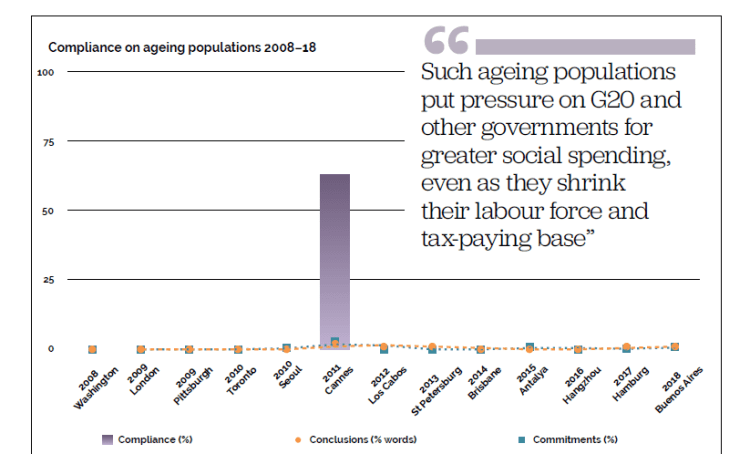Challenge
Proposal
Japan’s 2019 Osaka Summit will address the emerging issue of ageing populations and the impact on society. Japan itself has an increasingly elderly population, with more than 20% of its people aged 70 or older. Its labour force has dropped by 4.5 million people since 2012. Several other G20 members face a similar situation; all are affected in some way.
The G20 can benefit from collectively managing demographic challenges on a policy level, as they affect economic growth, fiscal management, social security systems and even monetary policy. Thus, the Osaka priority of ageing populations flows from the G20’s core mission of providing global financial stability and making globalisation work for all.
Conclusions
Since its Toronto Summit in 2010, the G20 has addressed ageing populations in its leaders’ communiqués, covering ageing societies, seniors, the elderly, old age pensions, poverty and social security for the aged. It has now dedicated a total of 1,318 words to the subject. The peak came at the 2017 Hamburg Summit, which dedicated 334 words in three outcome documents.
Commitments
G20 leaders have made nine collective, politically binding, future-oriented commitments on ageing populations. They cover the related subjects of social policy, labour and employment, macroeconomics and development. These nine commitments constitute only 0.35% of the 2,526 commitments the G20 has made in all.
The first commitment on ageing populations came at the 2010 G20 Seoul Summit. Leaders agreed to implement structural reforms and strengthen social safety nets such as pension plans. The following year, at the Cannes Summit, leaders made three commitments on ageing populations, linking the issue to labour and employment and macroeconomic policy.
Commitments on ageing populations then disappeared until the Antalya Summit in 2015. Here, G20 leaders made two commitments: they recognised the challenges that ageing populations posed to labour markets. They committed to explore the potential of the so-called silver economy. They reiterated this commitment and made one other at the Hamburg Summit in 2017, and made one commitment at Buenos Aires in 2018.
Compliance
The G20 Research Group has assessed only one of the nine commitments for compliance by G20 members. That commitment, made at the 2011 Cannes Summit, encouraged the participation of older workers and women in the labour market. G20 compliance averaged 63%. This was lower than that summit’s compliance average of 74% and the overall compliance average of 71%.
Nine G20 members fully complied with this commitment on ageing. They included the G7 members of Canada, Germany, Japan, the United Kingdom and the United States. Four members failed to comply: Mexico, South Africa, Indonesia and Saudi Arabia.
Corrections
With only nine commitments on ageing populations and only one assessed for compliance, it is difficult to directly identify how the low compliance of 63% on this issue can be improved. However, some suggestions for further consideration can be made.
First, for the Osaka Summit, Japan has put at the forefront of its priorities long-term issues that affect economic growth, including ageing populations. Such ageing populations put pressure on the G20 and other governments for greater social spending, even as they shrink their labour force and tax-paying base.
On the subjects of macroeconomic policy and labour and employment, compliance has been higher where G20 summit have made more commitments on each of these subjects. Leaders should thus consider making more commitments on ageing at Osaka, and at their following summits in Saudi Arabia in 2020 and Italy, with its own ageing population, in 2021.
Finance ministers have continued to meet every year since their leaders started meeting in 2008. The G20 has added meetings for ministers of labour and employment in 2010, and these appear to increase compliance with the leaders’ commitments on these subjects. These ministerial meetings and the summits could include more ageing-related aspects of social policy.
Future G20 hosts could consider holding a meeting of ministers’ responsible for ageing on their own.
More broadly, G20 leaders should continue to put social policies on their agenda, address their impact on economic growth and work to share best practices. Specifically, to address ageing populations, they should increase the effectiveness of social security and pension systems, consider how innovation and digitalisation can offset the effects of shrinking workforces, and design responsive immigration policies.
Finally, they should forge the link to the G20’s core purposes of promoting financial stability, fostering strong, sustainable, balanced and inclusive economic growth, and ensuring that globalisation works for all.
The views and opinions expressed in this article are those of the authors and do not necessarily reflect the views of the Global Solutions Initiative. This article was originally published in G20 Japan: The 2019 Osaka Summit by GT Media Group and the G20 Research Group, 2019. View the original article.









